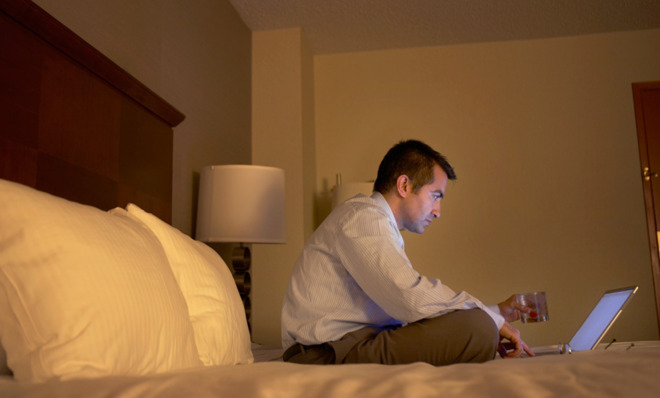5 ways to get a better night's sleep
Turn off the iPad — and take a cold shower!

A free daily email with the biggest news stories of the day – and the best features from TheWeek.com
You are now subscribed
Your newsletter sign-up was successful
"We are living in an age when sleep is more comfortable than ever, and yet more elusive," writes David Randall in Dreamland: Adventures in the Strange Science of Sleep. We spend about a third of our lives asleep or, at least, trying to sleep. In search of sleep, we're turning to prescription medications. But there is another way. Research has backed the following five tips.
1. Take a cold shower
Your body temperature plays a big role in getting a good night's rest. If you're going to have a shower before bed, make it a cold one. When we take a warm shower close to bed, we raise our body temperature, which naturally falls around 10 p.m. You simply can't get to sleep as easily if your body temperature is too warm.
The Week
Escape your echo chamber. Get the facts behind the news, plus analysis from multiple perspectives.

Sign up for The Week's Free Newsletters
From our morning news briefing to a weekly Good News Newsletter, get the best of The Week delivered directly to your inbox.
From our morning news briefing to a weekly Good News Newsletter, get the best of The Week delivered directly to your inbox.
One study by researchers in Lille, a city in northeastern France, found that subjects fell asleep faster and had a better overall quality of sleep following behaviors that cooled the body, such as taking a cold shower right before bed. [Dreamland: Adventures in the Strange Science of Sleep]
2. Keep your bedroom cold
The best predictor of quality sleep was maintaining a room temperature in a narrow band between 60 and 66 degrees Fahrenheit. [Dreamland: Adventures in the Strange Science of Sleep]
Studies have shown that temperatures outside of this range lead people to become restless. When we're too hot or cold we become antsy, tossing and turning trying to get comfortable. And for those of you who sleep naked and without a sheet, research indicates an optimum room temperature between 86 and 90 degrees Fahrenheit.
3. Ditch the iPad
The light from electronic devices messes with our sleep patterns. If you can't avoid using them, dim the brightness.
A free daily email with the biggest news stories of the day – and the best features from TheWeek.com
[B]right lights, including the blue-and-white light that comes from a computer monitor or a television screen, can deceive the brain, which registers it as daylight. Lying in bed watching a movie on an iPad may be relaxing, but the constant bright light from the screen can make it more difficult for some people to fall asleep afterward. [Dreamland: Adventures in the Strange Science of Sleep]
4. Exercise during the day
Those who exercised reported a better quality of sleep than those who remained sedentary. [Dreamland: Adventures in the Strange Science of Sleep]
Exercise during the day, even a small amount, helps you fall asleep faster. This seems obvious, right? The more physically exhausted you are, the better you sleep? But it's more complicated than that. It turns out that it's not just about exercise, it's more about seeing yourself as a fit person that matters. If you lay down to sleep and you're not worried about whether you're exercising, you have one less thing to be anxious about. But even if you're working out hard, research shows that exercise will not necessarily improve your sleep if you feel like you're not doing enough. This might be part of the reason that yoga has been linked to improved sleep. It puts helps your mind at ease and when you're trying to fall asleep. That matters more than you think.
5. Avoid coffee and alcohol
It is obviously not a good idea to drink coffee in the evening if it keeps you up at night. Nor is drinking alcohol before bedtime a smart move. Alcohol may help speed the onset of sleep, but it begins to take its toll during the second half of the night. As the body breaks down the liquid, the alcohol in the bloodstream often leads to an increase in the number of times a person briefly wakes up. [Dreamland: Adventures in the Strange Science of Sleep]
And a few more bonus suggestions:
Other common suggestions from sleep doctors include maintaining a consistent bedtime, using the bedroom only for sex or sleeping, and turning the lights down low in the home about a half hour before climbing into bed. [Dreamland: Adventures in the Strange Science of Sleep]
Learn more about sleep.
Shane Parrish is a Canadian writer, blogger, and coffee lover living in Ottawa, Ontario. He is known for his blog, Farnam Street, which features writing on decision making, culture, and other subjects.
-
 6 of the world’s most accessible destinations
6 of the world’s most accessible destinationsThe Week Recommends Experience all of Berlin, Singapore and Sydney
-
 How the FCC’s ‘equal time’ rule works
How the FCC’s ‘equal time’ rule worksIn the Spotlight The law is at the heart of the Colbert-CBS conflict
-
 What is the endgame in the DHS shutdown?
What is the endgame in the DHS shutdown?Today’s Big Question Democrats want to rein in ICE’s immigration crackdown